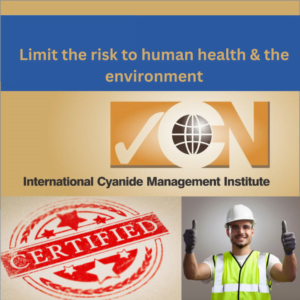International Cyanide Management Institute Certificate
Introduction:
In the realm of responsible mining practices, the International Cyanide Management Institute (ICMI) certificate emerges as a hallmark of commitment to the safe and environmentally conscious use of cyanide in mining operations. As the mining industry seeks sustainable solutions, the ICMI certificate provides a comprehensive framework for managing the risks associated with cyanide use, ensuring the well-being of communities, ecosystems, and workers. Let’s delve into the essence of the ICMI certificate, exploring its fundamental principles, the advantages it brings, and why it has become an integral part of responsible mining operations globally.
What is the ICMI Certificate?
The ICMI certificate is awarded by the International Cyanide Management Institute, an independent and internationally recognized organization committed to improving the management of cyanide used in gold and silver mining. This certification signifies that a mining operation adheres to the ICMI’s Cyanide Code – a set of principles and standards that promote the safe and environmentally sound management of cyanide throughout its life cycle. The ICMI certificate is applicable to mining companies, cyanide transporters, and suppliers involved in the cyanide supply chain.

Key Principles:
The ICMI certificate is rooted in key principles that guide organizations in adopting responsible practices in cyanide management. These principles include a commitment to comply with applicable laws and regulations, a focus on transparent communication with stakeholders, a dedication to worker safety and training, and the implementation of risk-based management systems. By adhering to these principles, mining operations can demonstrate their commitment to minimizing the environmental impact of cyanide use, ensuring worker safety, and fostering responsible mining practices.
Benefits of the ICMI Certificate:
Achieving the ICMI certificate brings a range of benefits for mining operations. Foremost among these is the ability to enhance the industry’s overall reputation by demonstrating a commitment to responsible and sustainable mining practices. The certificate also promotes transparency in cyanide management, fostering trust among stakeholders, including local communities and regulatory bodies. Moreover, the ICMI certificate can lead to operational efficiencies by systematically addressing cyanide-related risks, reducing incidents, and ensuring compliance with industry best practices.
Conclusion:
The ICMI certificate stands as a beacon for mining operations dedicated to prioritizing safety, environmental responsibility, and community well-being in their cyanide management practices. It goes beyond compliance, offering a roadmap for mining companies to demonstrate leadership in responsible mining. By embracing the ICMI certificate, organizations signal their commitment to ethical and sustainable mining practices, contributing to the broader industry’s efforts to minimize its environmental footprint and promote the well-being of both people and ecosystems. In a world where responsible resource extraction is imperative, the ICMI certificate remains a vital tool for mining operations striving for excellence in cyanide management.
